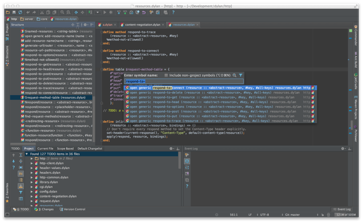Method dispatch in Dylan is the process by which the compiler and run-time collaborate to choose the right implementation of a function to call. This can get rather complex as a number of factors are involved in choosing the right method to call and whether that can be done at compile-time or deferred to run-time.
Unfortunately, full generic method dispatch at run-time in Open Dylan is currently not as fast as we would like. This means that when performance issues strike, they may well be due to the overhead of method dispatch.
Discussing and improving the overall performance of method dispatch isn't the subject of this post. That's going to require a fair bit of planning and work before that is resolved.
Instead, we're going to look at what to do when you're experiencing performance problems at particular call sites due to the overhead of method dispatch.
Sometimes, this is readily visible in the profiler:

Here, we can see that the percent-encode method in the uri library is going through dispatch to call member?. (I've translated from the names of the functions in C to their names in Dylan. The name mangling isn't that ...
read more »There are comments.
 Dylan Foundry
Dylan Foundry
